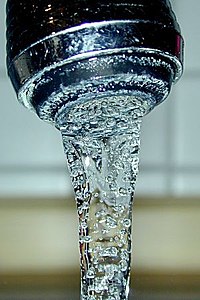Drinking water
Drinking water, also known as potable water, is water that is safe to drink or to use for food preparation.

Water in rivers, stream, lakes and underground may contain organisms that cause disease. It may also contain chemicals that might cause illness.
'Water treatment' involves filtering the water through sand beds and then adding a chemical to kill any remaining organisms.
The amount of drinking water needed for good health varies.[1] Americans, on average, drink one litre of water per day and 95% drink less than three litres per day.[2] For those who work in a hot climate, up to 16 litres a day may be required.[1] Liquid water is essential for life.[1]
In developed countries, tap water meets drinking water quality standards. Other uses include washing, toilets, and irrigation. Greywater (wastewater) may be used for toilets or irrigation. Using greywater for irrigation may have risks. Water may be unacceptable if it has high levels of toxins or suspended solids.
Related pages
change- Joseph Bazalgette for the story of how modern water systems got free of dangerous bacteria.
References
change- ↑ 1.0 1.1 1.2 Ann C. Grandjean (August 2004). "3" (PDF). Water Requirements, Impinging Factors, & Recommended Intakes. World Health Organization. pp. 25–34. Archived (PDF) from the original on 2016-02-22. This 2004 article focuses on the American context and uses data collected from the US military.
- ↑ Exposure Factors Handbook: 2011 Edition (PDF). National Center for Environmental Assessment. September 2011. Archived (PDF) from the original on 24 September 2015. Retrieved 24 May 2015.